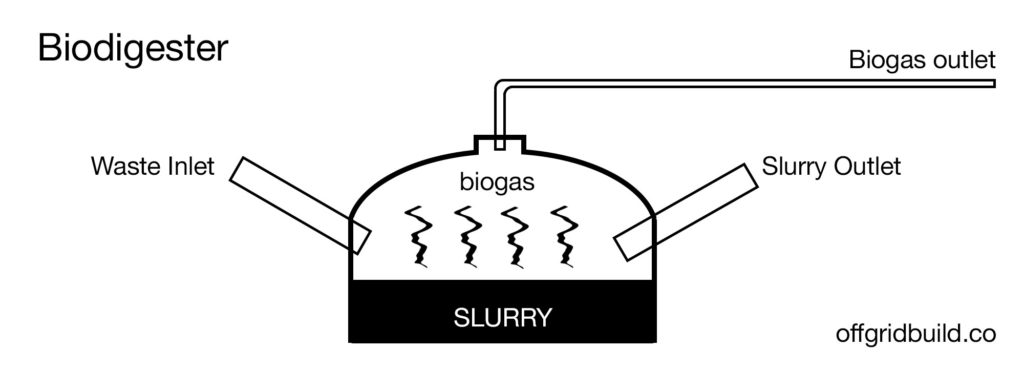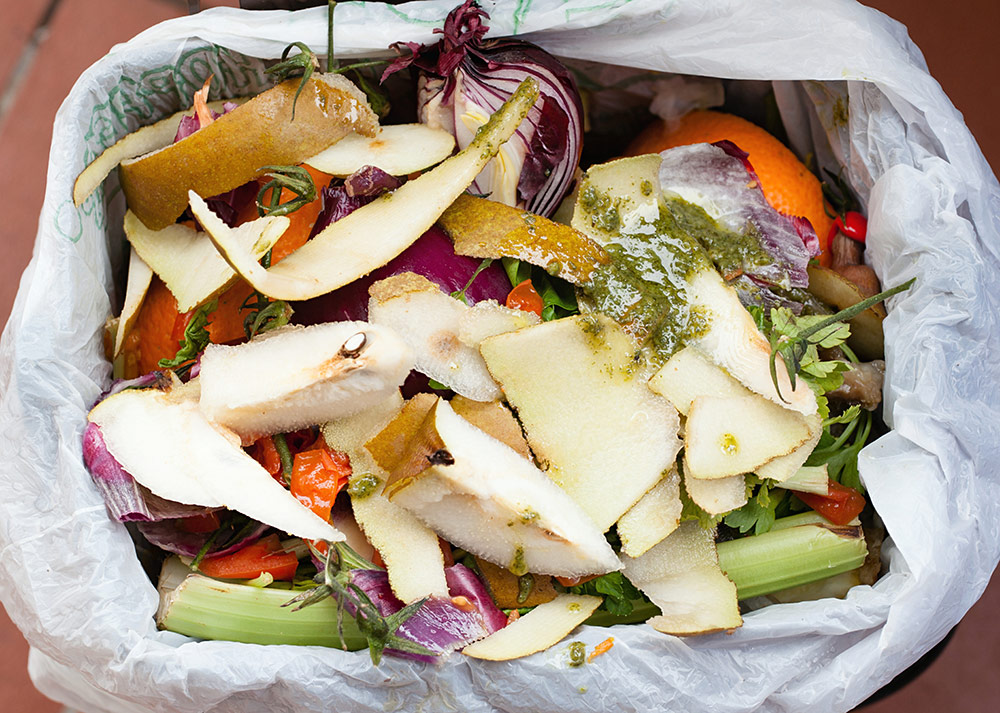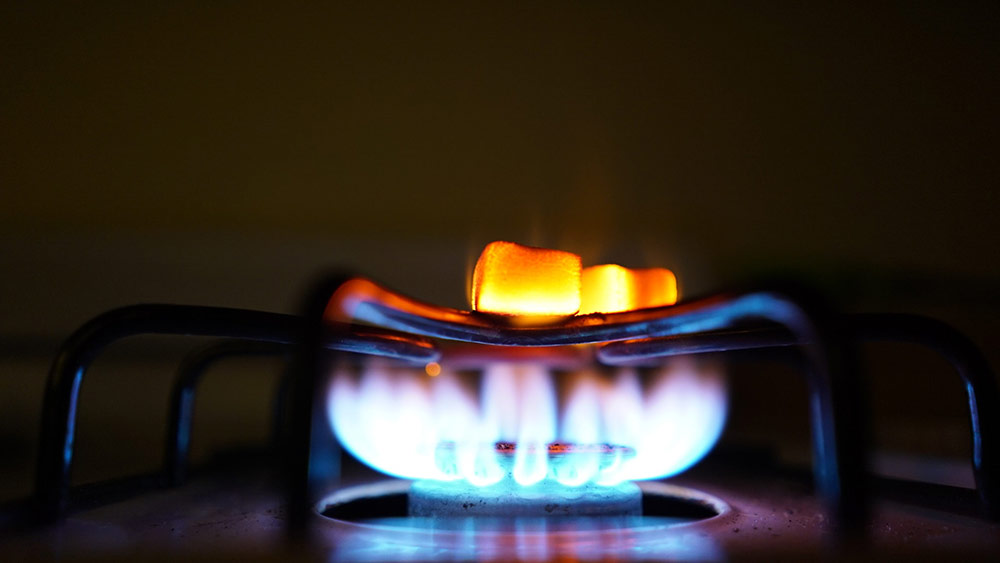A Biodigester is a relatively new option for off-grid use and something you should be considering. There are more and more options when it comes to renewable fuels in your off-grid build. Creating your own biogas from your organic waste is a sustainable option for those choosing to live off-grid. The biogas and the by-products from your biodigester can be used for a range of applications including cooking and fertiliser on your garden.
What is a biodigester?
A biodigester is a system that uses bacteria to naturally break down organic waste and convert it into usable biogas. The scientific term is anaerobic digestion. The resulting biogas can be used in cooking, power generation or heating. You do need some specialised equipment if you want to generate power. For heating and cooking, you can use the gas directly out of the system.
In off-grid situations, you will usually be composting your food, garden waste and animal waste. Instead of putting that waste on your compost it goes in the biodigester instead. The system is straight forward and you can easily make your own or buy an off-the-shelf product.
Commercial biodigesters mostly use animal waste as the main ingredient in the system. This is due to the sheer volume of waste generated on a farm. Farms that generate their own biogas. Biodigesters do require a decent amount of atmospheric heat so they are more effective in warmer climates. That being said, there are some very large commercial plants successfully running in the UK.
How does it work?
A biodigester is a simple system with no moving parts. The basic requirements can be found at your local hardware store.
- a holding tank with inlets and outlets
- bacteria
- organic waste

The system only requires water and organic waste as input. The output is the biogas and bio-slurry, sometimes called just slurry. Most systems use a dome roofed holding tank to make gas collection easier. The input can be fed in via pipes or a hatch for larger waste product.
What can you put in a biodigester?

Almost every house will generate organic waste. This includes your food scraps, garden, human and possibly livestock waste. If you keep animals their manure is a great source for biogas. Instead of having a giant manure pile somewhere that you have to keep far away from the house, you can put it into your biodigester. Reducing the environmental smell and footprint.
You can also send your black water into the biodigester in an off-grid setup. The bacteria in the biodigester are very efficient at breaking down the fats and proteins found in human waste. A biodigester is an excellent way to process your various onsite waste safely and easily.
Why should you consider a biodigester?
A biodigester is a very simple system that is easy to use. There are a number of reasons you should consider a biodigester for your off-grid build. Here are the 7 reasons why you should consider this kind of system.
1. Biogas
The number one reason you should consider a biodigester is you are creating your own renewable fuel. This can be a great replacement for propane based solutions. It’s also not as crazy or resource-intensive as generating your own hydrogen onsite. You can use this gas to cook your food, heat your home or generate power. You do need a generator that can handle biogas but it is still possible with the right equipment.
2. Easy Setup & Maintenance-free
Setting up your digester is easy and pretty much anyone can do it. You can use an IBC tank or another holding vessel to build your digester. Once they are in operation, they are maintenance-free. So long as you continue to feed the system waste and a little bit of water, they can run indefinitely. Producing biogas for use in your off-grid build whenever you need it.
3. Completely off-grid
This is as off-grid as it gets, producing 100% renewable gas from your own waste products. The system requires no external power systems making them perfect for your off-grid built. The only limit is how much waste you produce will determine how much gas you get. Depending on the size of your biodigester you can easily generate up to 2 hours of cooking gas a day.
4. Amazing liquid fertiliser
A biodigester also creates nutrient-rich liquid fertiliser. After a couple of months, the slurry is discharged from the system. This slurry is mostly made up of water and nutrient-rich materials. The main ingredients in the slurry are nitrogen (N), Phosphorus (P) and Potassium (K). These are key nutrients required for healthy plant growth. The slurry includes other elements such as potassium, zinc, iron, manganese and copper that also help with plant growth. The liquid fertiliser is odour-free, safe and ready to use. Unlike normal manure that can contain bad pathogens harmful to you and the environment.
5. Easy waste disposal
A biodigester is your all in one solution for waste treatment. Instead of having multiple different systems to build, install and maintain. You have a single, simple solution. The best part is the biogas and liquid fertiliser that is produced. This increases your ability to be completely self-sufficient without the need for fossil fuel-based solutions.
6. Affordable all-round waste solution
Is very easy to build your own digester or you can buy an off the shelf solution relatively cheaply. If you’re looking to be budget-friendly then the DIY route is for you. You can find all the parts you need at your local hardware store and make it in a day. A couple of rain barrels or an IBC is all you need for the holding tank and some plumbing parts. There are a number of websites and youtube videos to show you how to build your own.
7. Reduces greenhouse gas emissions
Capturing and storing methane and then burning it off is a great reason to generate your own biogas with a biodigester. Methane is a major source of greenhouse gas emissions and by capturing the livestock waste and human waste you’re reducing your carbon footprint. In a commercial sense, we should be encouraging farms to build biodigesters to generate power. Solar and wind are just two of large scale solutions in use today, biogas and biodigesters should be another consideration.
Conclusion
You should seriously consider a biodigester for your off-grid build as its a great all in one solution for your waste and energy needs. The fact that the system is so easy to build, requires no maintenance or power is the reason why this should be top of your list. If you have livestock this can help heat their barn in the winter. We have been seeing more and more biodigesters in tiny homes and other off-grid projects in recent years. Now is the time for you to consider this easy setup.

